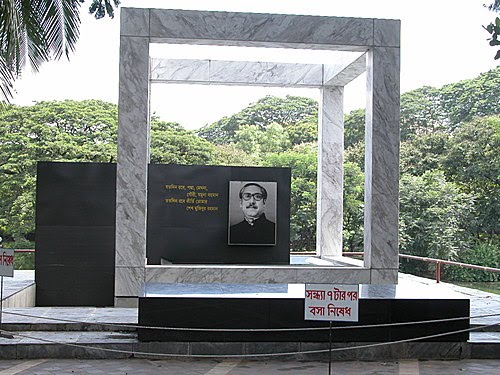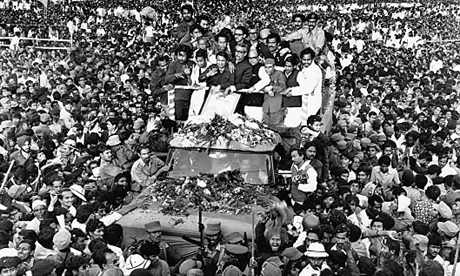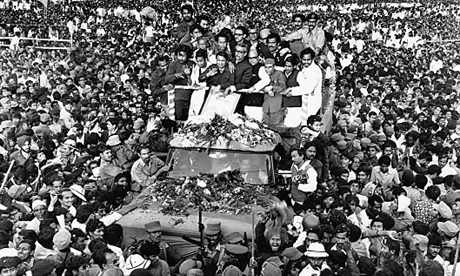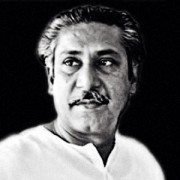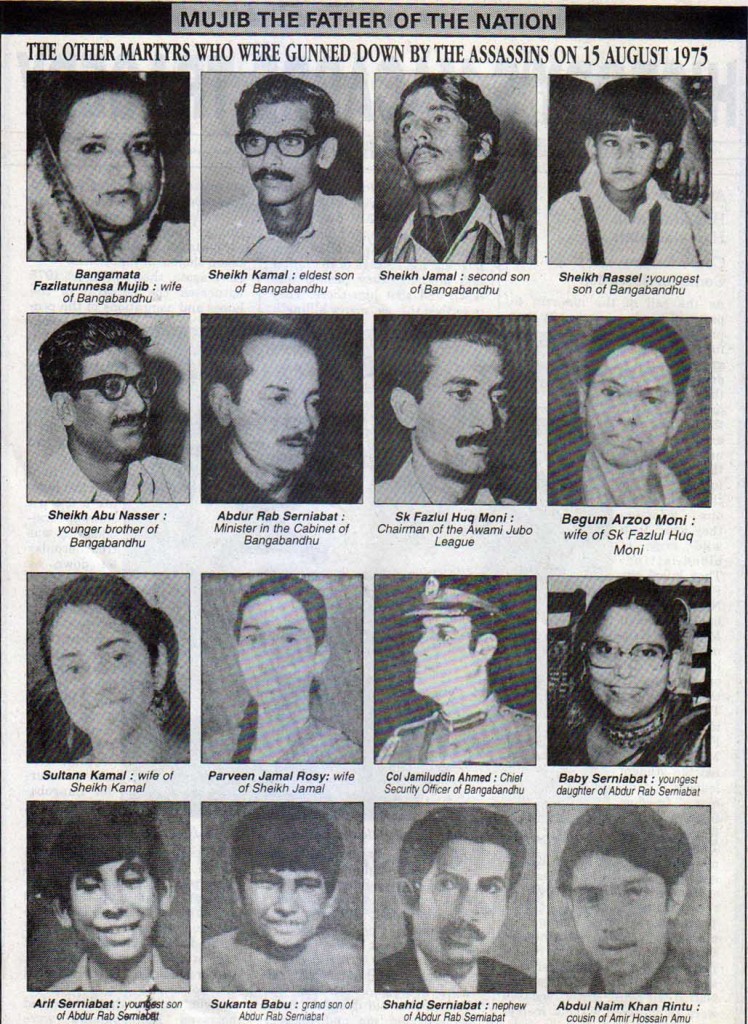The Original Sin…
It has been more than a mere trial. On August 15, 1975, Bangabandhu Sheikh Mujibur Rahman, along with 13 members of his family, was brutally murdered by a bunch of disgruntled, degenerate members of the Army. Obstacles were created to bar the trial of the killers, not only that, Zia, Ershad and Khaleda governments gave them protection and diplomatic jobs, creating a society where killers of innocent men, women and children can go scot-free. It has taken the nation 34 long years to bring Bangabandhu’s 12 killers to book. Last week’s Supreme Court verdict is a giant step towards establishment of a society based on democracy and the rule of law.
Barrister Sheikh Fazle Noor Taposh, one of the three survivors of the August mayhem, will never forget the dawn of August 15, 1975. Taposh, who was around four years old at that time, was sleeping in his room with his brother when he heard his father’s footsteps in the stairs. Sheikh Fazlul Haq Moni, one of the organisers of the Liberation War was going downstairs to pick up “the day’s newspaper or a book”, Taposh could not quite recall. As he reached the landing space of the stairs, a bunch of killers led by Risaldar Moslehuddin got hold of him. Moni, Bangabandhu Sheikh Mujibur Rahman’s nephew, was told to walk ahead. “You are under arrest,” said the Risaldar.
“Meanwhile, my mother came down,” says Taposh, “Before the killers fired at my father, in an attempt to save him, my mother came before the gun and both were shot.” She was seven-months pregnant at the time of the killing.
Taposh and his elder brother were eyewitnesses to one of the grisliest and barbaric murders in human history. “After the massacre, Mrs Fatema Selim, one of our aunts, took us to a safe house, telling us that it was not safe to stay in that house any more,” Taposh says.
He was completely devastated. “Even though I was a mere toddler at that time I knew what I had lost,” Taposh says. He and his brother have been lucky because within a few hours after the murders, the killers came back looking for Moni’s two sons that they had orphaned.
Taposh still bears the trauma of the loss. “I won’t be able to tell you what I feel. Parents are a person’s biggest assets. I miss them in every step of my life’s successes and failures, achievements and defeats,” he says. Taposh, who has recently survived an assassination attempt, says that he missed his father when he first became a barrister.
The first attack on the night of August 15 was launched on Abdur Rab Serniabat’s house. In the 20-minute-long killing spree that ensued, the murderers killed Serniabat, his wife, daughters and three minor members of his family. Serniabat’s son Abul Hasnat Abdullah, a survivor in the family who has luckily escaped on that frightful night, told a British journalist, “I later saw my wife, mother and 20-year-old sister badly wounded and bleeding.” He says that his two young daughters, uninjured, were sobbing behind a sofa where they had hidden during the massacre. Lying dead on the floor were his 5-year-old son, two sisters aged 10 and 15 and his 11-year old brother, the family ayah (maid), a house-boy and his cousin Shahidul Islam Serniabat.
On the night of August 15, 1975, the killers divided themselves into several groups. The first one, led by Lt Col (then Major) SHBM Nur Chowdhury and Lt Colonel (then Major) Mohiuddin Ahmed, went to the historic house at Dhanmandi road no 32. The second group, assigned to kill Abdur Rab Serniabat and his family members, was led by Major Dalim, and Risaldar Moslehuddin Khan led the third group, which launched an attack on Sheikh Fazlul Haq Moni’s house.
When the massacre was going on at Serniabat household, Bangabandhu got a call from the house. “Get the police control room,” he told his personal assistant Muhitul Islam. When he could get neither the police station nor the Ganobhaban Exchange, Bangabandhu himself tried to make a call. A hail of bullets poured in and Mujib told Islam to duck under the table. A few minutes later Bangabandhu got up and went out to the veranda. Meanwhile, the butchers had already killed Sheikh Kamal and Sheikh Jamal. By that time Major Mohiuddin took Bangabandhu to the landing of the stairs. Nur appeared in the corner and said something to Mohiuddin, to which the latter moved to one side. “What do you want?” Bangabandhu asked. There was silence. Nur and Major Huda then simultaneously fired volleys of bullets from their Sten guns. Bangabandhu’s whole body twisted back and slipped to the landing of the stairs. It was 5.40 in the morning. Mujib’s death could not quench the blood-thirst of the murderers, Begum Fazilatunnesa Mujib, Bangabandhu’s wife, embraced martyrdom within a few minutes. The killers then went into one room after the other and killed Bangabandhu’s two daughters-in-law.
The killers looked for Sheikh Russell, Bangabandhu’s 10-year-old son, and found him in a corner. “I want to go to my mother,” Russell, merely a toddler, cried. “We are taking you to her,” said one of the killers and took him to first floor. There were volleys of gunshots.
Khandakar Moshtaque Ahmed, who declared himself President on August 15 following Bangabandhu’s brutal assassination, on 26th September promulgated an ordinance indemnifying the killers. The Ordinance was promulgated, as the Bangladesh Gazette dated that day says, “ to restrict the taking of any legal or other proceedings in respect of certain acts or things in connection with, or in preparation or execution of any plan for, or steps necessitating, the historical change and the Proclamation of Martial Law on the morning of 15th August, 1975.”
The murders have been brutal and barbaric as it is, but to indemnify the killers of pregnant women and children have been something unheard of. With the brutal and barbaric murders of August 15, Bangladesh, as a nation, plunged into an abyss of darkness. Within nine days of the mayhem, the then Army Chief Gen Shafiullah was sent into retirement and was replaced by his second-in-command Gen Ziaur Rahman. Since then, except for the four days of November 3-7, 1975, Zia was at the centre of power. There has been widespread allegation that Gen Zia gave the killers the go-ahead to assassinate Mujib and his family. Lt Col (dismissed) Farooq, in a confessional statement given to the trial court on December 19, 1996 said that Lt Col (retd) Sultan Shahrier Rashid Khan told him prior to the massacre that Zia would support them if Mujib was killed.
“There are multilateral dimensions to the conspiracy,” says Syed Anwar Husain, professor of History at University of Dhaka. He says that there is evidence, however a little bit peripheral, to suggest Zia’s involvement in the August massacre. “This evidence arises out of his perfunctory reaction upon being informed that Bangabandhu was killed. Zia replied, ‘President is killed, so what? The Vice President is there. Uphold the constitution’.”
These staccato sentences, Professor Anwar says, when analysed together, lead to disturbing conclusions. “Firstly,” he says, “it appeared that he took this very barbaric and dastardly incident very lightly, meaning he had a foreknowledge of the happenings.” He also says that Zia said the right thing by urging everyone to uphold the constitution under such abnormal circumstances. “Anybody in a responsible position could have said the same thing; but the core statement, which makes us suspicious is: ‘So what?'”
In fact, it was Zia who incorporated the infamous Indemnity Ordinance into the constitution, constitutionally protecting the killers of innocent men, women and children. “Zia was at the forefront of all the beneficiaries of this tragic happening. He was the man who did everything to shield the killers from any legal process and he also managed to provide them with safe passages out of the country,” Professor Anwar says.
In fact, Zia’s assumption of power was coated with the blood of the martyrs of the August 15 mayhem. The killers have found a benevolent friend in Gen Ziaur Rahman– he gave them diplomatic jobs, legal protection by incorporating the Indemnity Ordinance into the constitution at his own rubber-stamp, pet parliament.
Even though Bangabandhu’s killers are about to walk the gallows in a month, Zia’s involvement in the August carnage waits to be unearthed. The murders gave birth to a string of bloody coups and counter-coups. There was a government in Dhaka, but there had been alternative centres of powers at different times in the months of August, September, October and November, 1975.
The culture of coup, conspiracy and murder that was given birth to in 1975, continued. Zia himself survived several coup attempts, all of which he suppressed with an iron hand. During Zia’s regime there had been several trials for launching coups, and interestingly in most of the cases those who were on the dock were army officers who fought during the Liberation War; but for the August 15 killers waited only government benefits. On May 30, 1981, Zia himself became a victim of coup; he was assassinated in Chittagong. And those who were put to trial before a martial law court were also freedom fighter officers of the Bangladesh Army. It seemed as though a conspiracy had been hatched to purge the army of Muktijoddha officers.
Bangabandhu’s murder has destroyed all the major democratic institutions of the country. Judiciary, in the hands of different military dictators, was used to legitimise the latter’s illegal hold on power. Elections became a joke, and one of the worst victims of the August 15 mayhem has been the Armed Forces of the country. For 15 long years the nation was rattled by a culture of killing and impunity that started through the massacres of August 15; and our Army was no exception. Militarisation of governance has done no country any good, and as a result of it both the Army and the country’s wobbling democracy suffered.
In 1990, the Armed Forces took the courageous stance of refusing to obey the dictatorial regime of General HM Ershad. During the mass upsurge, at the fag end of Ershad’s regime, the army high command refused to fire on the masses that took to the street to bring down Ershad’s illegal rule. The mass movement paved the way to restoration of democracy, which we had lost on August 15, 1975 through the brutal murder of Bangabandhu Sheikh Mujibur Rahman.
Khaleda Zia, Ziaur Rahman’s widow, who assumed power after democracy was restored in 1991, kept her late husband’s policy regarding the killers unaltered. In the February 15, 1996 general elections, held when Khaleda was in office, Khandaker Abdur Rashid, one of the self-confessed killers of the Father of the Nation, was elected uncontested. And the subsequent governments that followed the carnage have all had their fair shares in abetting the killings. One of the basic tenants of democracy is the rule of law and as they did not hold trial of the killers of innocent, unarmed men, women and children, the basis on which Zia, Ershad and Khaleda regimes held power was immoral, if not illegal.
Khaleda Zia’s sympathy for Mujib’s killers can only be explained if clear evidence of Zia’s hand in Mujib murder can be found. Not only did Khaleda follow her late husband’s policy on the killers, during her second term in office the Mujib murder case was deliberately stalled through the creation of one government-made obstacle after the other. Zia helped the killers flee: Khaleda made their trial difficult.
The trial of the killers, done in a free and transparent manner, finally ended last week, 34 years after the murders. The Awami League government deserves kudos for not tampering with justice, keeping the judicial system free from undue influences. Last week’s Supreme Court verdict that upheld the death penalty of Bangabandhu’s 12 killers is immensely significant on several counts. It proves that no matter how long it is or how well protected the killers are, there is no law in the country that can save murderers of innocent men and women. To establish a society based on the basic tenants of the rule of law it is a must that killers are punished; and that is exactly what has happened through the Supreme Court verdict. During the era of military dictatorships, there are several instances where judges, at gunpoint, had to legitimise the despotic rules of different military dictators. This verdict has also absolved the highest court of the land of its previous sins.
Last week our Supreme Court has at last given us the opportunity of heaving a collective sigh of relief. The dark era of misrule, abuse of power and impunity that has prevailed over the years has come to an end. We demand a quick execution of the verdict, with which we also wish to move on as a nation towards the establishment of Golden Bengal that Bangabandhu Sheikh Mujibur Rahman had dreamt of but could not achieve. Our goal should now be to build a happy and prosperous nation. Establishment of a country based on rule of law, democratic values, and social and economic justice is perhaps the biggest tribute we can pay to our Father of the Nation.
Author – Ahmede Hussain

